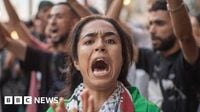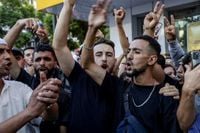Morocco finds itself in the international spotlight following a sweeping crackdown on youth-led protests that erupted across the country in late September 2025. According to reports from Al-Monitor and Amnesty International, security forces have arrested more than 400 protesters—many of them young people—as demonstrations demanding government accountability and sweeping reforms have spread from Casablanca and Marrakech to Tangier, Salé, Oujda, Rabat, and Agadir. The protests, largely organized by a decentralized movement calling itself “Gen Z 212,” have been fueled by deep frustration over failing public services, high unemployment, persistent corruption, and anger at government spending priorities, especially the vast outlays for Morocco’s 2030 World Cup preparations.
What began as peaceful assemblies quickly escalated after authorities responded with what Amnesty International describes as “unlawful force and mass arbitrary arrests.” The organization, which has reviewed video footage and spoken with eyewitnesses, reports that at least three protesters have been killed, dozens injured, and at least 409 arrested since September 28. The crackdown has drawn condemnation from international human rights groups and prompted calls for an immediate, independent investigation into the security forces’ actions.
On the night of September 30, video footage reviewed by Amnesty International showed security forces driving their vehicles directly at groups of protesters and violently arresting them. Eyewitnesses described scenes of chaos, with officers in plain clothes surrounding and forcibly detaining individuals, sometimes without provocation. One protester recounted to Amnesty International, “I saw a girl who was sitting on the floor, doing nothing, not even chanting or shouting slogans get carried forcibly by security forces, she was asking them ‘what did I do?’ and saying ‘it’s my right to be here’ but they did not answer her and shoved her violently into the van.”
These accounts are backed by a growing body of video evidence posted online, showing security personnel—sometimes in civilian clothes—dragging peaceful demonstrators into police vans. In one particularly disturbing incident, security vehicles were seen driving straight into a crowd in Oujda on the night between September 30 and October 1, resulting in at least one serious injury. Amnesty International described such actions as “a dangerous and unlawful use of force, placing lives at risk and escalating violence,” and called the use of vehicles to strike demonstrators a “flagrant violation of international human rights standards.”
While the protests were largely peaceful in their early days, the situation deteriorated after September 30. According to Amnesty International, some protesters began to respond with violence, including the destruction of police property and setting vehicles on fire. Security forces, in turn, escalated their response, deploying tear gas, rubber bullets, and even lethal ammunition. The Moroccan Interior Ministry has reported that at least 263 security personnel and 23 civilians have been injured during the unrest. However, human rights groups maintain that the authorities’ response has been disproportionate and has endangered lives.
Official figures indicate that at least 409 people have been arrested since September 28, with more than 193 facing trial—some of them minors. Many of those arrested are being charged under Article 591 of the Moroccan Penal Code, which criminalizes participation in gatherings deemed violent. Yet, as Amnesty International points out, many of these individuals were detained on September 28 and 29, before any violence was reported. Lawyers interviewed by the organization expressed concern over the difficulty in confirming the exact number of those still detained, as the situation on the ground remains fluid and numbers change daily.
The crackdown has not only targeted participants but also those speaking to the media. One protester from Casablanca told Amnesty International, “The police were specifically targeting anyone who spoke to the media, I saw them rush towards a person who was giving an interview to two journalists, he was speaking into the microphones when the police came from behind him and forcibly carried him away.” This pattern, documented in multiple videos, has raised concerns about arbitrary detention, lack of due process, and a chilling effect on freedom of assembly and expression.
Heba Morayef, Regional Director for the Middle East and North Africa at Amnesty International, issued a stern statement: “We are deeply alarmed by emerging evidence of Moroccan security forces’ use of excessive force and mass arrests of protesters and bystanders. The authorities should ensure a transparent investigation into the deaths that occurred and must respond to any incidents of violence by exercising restraint in line with international guidelines. Morocco’s authorities must ensure the right to peaceful protest is protected. No one should be punished for exercising their human rights, demanding their economic or social rights or an end to corruption.”
Morayef further emphasized that, “Under international law, the use of lethal force by law enforcement officials is prohibited unless it is strictly unavoidable to protect life. Authorities must adopt all available measures to avoid resorting to the use of force, and where force is unavoidable, it should be strictly necessary and proportionate, and they must ensure it is used with precaution to minimize harm.” Amnesty International has called on Moroccan authorities to immediately drop charges against anyone detained solely for exercising their right of peaceful assembly and to respect their international human rights obligations.
The “Gen Z 212” movement, which organized the protests through social media platforms like TikTok, Instagram, and Discord, has voiced demands for better education, equitable healthcare, decent employment opportunities, transparency, and anti-corruption measures. Their decentralized structure has made it difficult for authorities to identify leaders, but it has also allowed the movement to spread rapidly and draw support from a broad cross-section of Moroccan youth. The protesters’ grievances, centered on economic hardship and government accountability, have resonated with many across the country, especially as Morocco faces rising unemployment and persistent service shortfalls.
The Moroccan government, for its part, has justified its response by pointing to the violence that erupted after September 30 and the injuries sustained by security personnel. However, critics argue that the authorities’ heavy-handed tactics—including the use of lethal force and arbitrary arrests—have only deepened public anger and undermined trust in the government’s willingness to address legitimate concerns.
As of October 3, the situation remains tense, with many cities still under a heavy security presence and hundreds of families anxiously awaiting news of detained loved ones. The international community, led by groups like Amnesty International, continues to press for accountability and the protection of basic rights. Whether Morocco’s leaders will heed these calls or double down on repression remains to be seen—but for the country’s youth, the message is clear: the demand for change will not be easily silenced.



